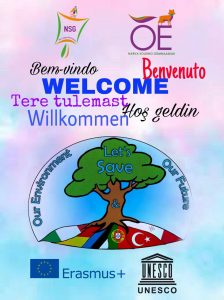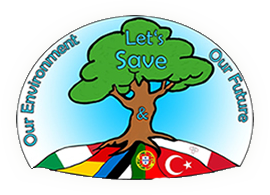 Environmental problems, which have arisen as a result of humankind’s approach from past to present, which can be summarized as “dominating nature” and “using nature crudely”, are one of the fundamental problems of world societies. The increasing demand for resources has gradually led to loss of productivity and reduction of biodiversity. According to the EU environment and climate report, depletion and pollution of water resources can cause serious problems and water scarcity could affect a third of the world’s population by 2025. Environmental pollution has reached horrific levels for every country. This is a problem for the whole world and European countries. All European countries accept that if we want to raise a healthy society, we must start by solving environmental problems. The way to achieve European citizenship is to have environmental awareness. If we want to spread and develop environmental awareness and European citizenship awareness, we need to start from school education and teachers’ awareness. Change and development all over the world begins with education. At this point, schools and teachers have a lot of work to do. For this reason, we want to take part in European and Erasmus+ events, raise awareness about combating environmental pollution and climate change and pass this on to future generations. Among the EU Goals, activities planned to combat environment and climate change are among the horizontal priority issues. Environmental awareness also focuses on being inclusive and holistic, as it is a common problem for people of all ages, races and religions, and in this respect, it is among the priority targets of EU Erasmus+ with its subject and features. With LTT events, we want to ensure that our teachers and students are active parts of the solution to environmental problems with STEAM-based methods and techniques. We want to develop a common European citizenship awareness with our project, which is a joint work of organizations, schools and non-governmental organizations of different structures for our world, which is a common value of all countries.
Environmental problems, which have arisen as a result of humankind’s approach from past to present, which can be summarized as “dominating nature” and “using nature crudely”, are one of the fundamental problems of world societies. The increasing demand for resources has gradually led to loss of productivity and reduction of biodiversity. According to the EU environment and climate report, depletion and pollution of water resources can cause serious problems and water scarcity could affect a third of the world’s population by 2025. Environmental pollution has reached horrific levels for every country. This is a problem for the whole world and European countries. All European countries accept that if we want to raise a healthy society, we must start by solving environmental problems. The way to achieve European citizenship is to have environmental awareness. If we want to spread and develop environmental awareness and European citizenship awareness, we need to start from school education and teachers’ awareness. Change and development all over the world begins with education. At this point, schools and teachers have a lot of work to do. For this reason, we want to take part in European and Erasmus+ events, raise awareness about combating environmental pollution and climate change and pass this on to future generations. Among the EU Goals, activities planned to combat environment and climate change are among the horizontal priority issues. Environmental awareness also focuses on being inclusive and holistic, as it is a common problem for people of all ages, races and religions, and in this respect, it is among the priority targets of EU Erasmus+ with its subject and features. With LTT events, we want to ensure that our teachers and students are active parts of the solution to environmental problems with STEAM-based methods and techniques. We want to develop a common European citizenship awareness with our project, which is a joint work of organizations, schools and non-governmental organizations of different structures for our world, which is a common value of all countries.
What do we want to achieve by implementing the project?
Our project is about environmental pollution, its consequences and climate change. “Environmental pollution” is the intense mixing of foreign substances into the air, water and soil, which negatively affects the living activities of living elements in the environment, causes structural damage to non-living elements and deteriorates their qualities. Environment and climate change represent the EU’s most important and challenging policy areas. Sustainability is of great importance so that future generations can use and benefit from natural resources. As partner countries, we want to contribute to the environment and solve environmental problems. We want to achieve this either by reducing the amount of trash and waste or by taking advantage of them using STEAM applications. Economical use of existing resources, choosing sustainable energy sources, stopping waste and saving on electricity bills, reducing consumer products and creating a “carbon and ecological footprint” are among the contributions we plan to make with our project. We want to raise individuals who benefit from STEAM applications of scientific and technological developments in the 21st century to find solutions to environmental problems, who realize the importance of green areas and do their best for greening, and who are knowledgeable about the definition, types and management of green areas. Gaining experience on the importance and ways of waste and recycling. With this project we aim to create personal responsibility through environmental awareness among students in Europe, with the aim of promoting the active citizenship element of democratic society. We aim to be the transition point to individual activism to eliminate the consequences of global warming and for the future of our world.
What project outcomes and other results do you expect your project to have?
With this project we aim to create personal responsibility through environmental awareness among students in Europe, with the aim of promoting the active citizenship element of democratic society. We aim to be the transition point to individual activism to eliminate the consequences of global warming and for the future of our world. Project Results: Environmental pollution and climate change kit, e-book and manual. The modules in this prepared kit include: ecology, water pollution, Air pollution and climate change, Natural disasters Recycling waste, renewable energy sources and savings Soil pollution. It consists of 4 modules.
Additionally, the measurements we made with the experimental kits will also be included in the kit. Such a kit is a useful material that we can use in our classes in our schools. Additionally, the e-kit version will also be available on the official project page on the digital platform. Thus, information will be obtained and used in every environment. It will be available for free and will be used as an accessible educational material by individuals, institutions and foundations when needed. Our kit, which was completed at the end of May 2023, will be used in the remaining 6 months of our project, and we will have the opportunity to monitor, evaluate and observe its applicability throughout the project.
Environmental pollution and climate change awareness kit website will be created in 6 languages for 11-15
A web page will be created to digitize our environmental pollution and climate change kit. At the same time, the necessary measures will be taken to serve as a social platform, an interactive environment where wishes, requests and complaints are written and environmentalists come together. Our official project site will be designed taking all these criteria into consideration. In this way, an international, multicultural, environmentally friendly social network will be formed. One of our primary goals is to be a platform where environmental problems in different parts of the world are discussed and solutions are produced. During our project, LTT photos, videos, all data analysis and graphics will be available on this site. It will shed light on raising individuals’ awareness about the environment and generating new ideas and solutions for people. It will be designed as a free and open platform for everyone to use.
Experiment Kits
The limitations of STEAM-based learning environments led us to make these experimental kits. We also decided to make these test kits because of the effect of abstracting air, water and soil pollution by experimenting and experiencing it with data and analysis. Permanent learning is very important for students’ environmental awareness. The target audience of the test kits will be shared with students and teachers at our partner institutions and surrounding schools. Our Italian partner, CSFNSM, is an institution that produces and runs a series of STEAM events to promote and spread environmental and scientific culture for educators and students. In this direction, the Laboratory will develop the ability to use scientific knowledge in concrete situations through STEAM studies, with IBSE (Inquiry-Based Science Education) approaches, and will be a leader by carrying out activities that interest, encourage and interest children using STEAM. Collaborative learning methodology. We will create 2 test kits, one for children aged 5-10 and the other for children aged 11-15. With Kit1, it is aimed to carry out the learning session with a gamification approach, based on low-cost materials. Kit-2: Experiment set for young students aged 11-15. Based on Arduino or similar technologies and performing small-scale real STEAM experiments, the tests are designed to suggest a trip to explore the water source and the integrated water cycle.
In this way, they will gain skills in STEAM applications. They will learn experiment and observation methods and the processing of these data. He will witness this pollution by analyzing water, air and soil on the environment. Different measurements will be compared and the results discussed with students. They will be able to understand that water is, in one way or another, a product of daily consumption and the habitat of various living creatures. Thus, students will be motivated to use it more consciously. Experiment kits will take their place in school laboratories and will be used in science, biology and compulsory courses. Thanks to the kits we obtained from our project, we will be able to conduct experiments on the environment and STEAM for many years. On June 5, World Environment Day, we will include environmental schools in our workshops covering these practices (water, air and soil pollution rates, etc.).


